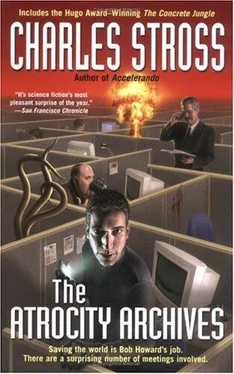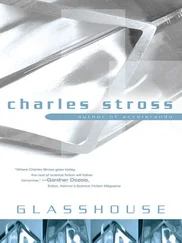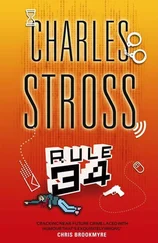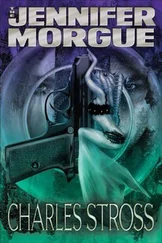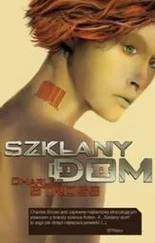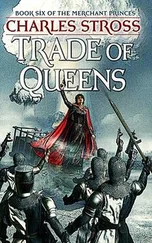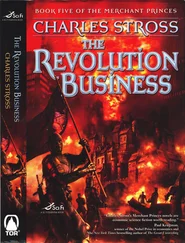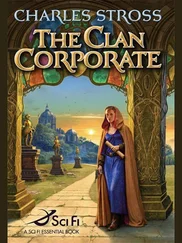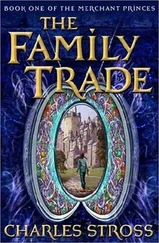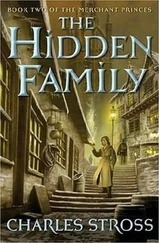Charles Stross - The Atrocity Archives
Здесь есть возможность читать онлайн «Charles Stross - The Atrocity Archives» весь текст электронной книги совершенно бесплатно (целиком полную версию без сокращений). В некоторых случаях можно слушать аудио, скачать через торрент в формате fb2 и присутствует краткое содержание. Жанр: Киберпанк, на английском языке. Описание произведения, (предисловие) а так же отзывы посетителей доступны на портале библиотеки ЛибКат.
- Название:The Atrocity Archives
- Автор:
- Жанр:
- Год:неизвестен
- ISBN:нет данных
- Рейтинг книги:3 / 5. Голосов: 1
-
Избранное:Добавить в избранное
- Отзывы:
-
Ваша оценка:
- 60
- 1
- 2
- 3
- 4
- 5
The Atrocity Archives: краткое содержание, описание и аннотация
Предлагаем к чтению аннотацию, описание, краткое содержание или предисловие (зависит от того, что написал сам автор книги «The Atrocity Archives»). Если вы не нашли необходимую информацию о книге — напишите в комментариях, мы постараемся отыскать её.
The Atrocity Archives — читать онлайн бесплатно полную книгу (весь текст) целиком
Ниже представлен текст книги, разбитый по страницам. Система сохранения места последней прочитанной страницы, позволяет с удобством читать онлайн бесплатно книгу «The Atrocity Archives», без необходимости каждый раз заново искать на чём Вы остановились. Поставьте закладку, и сможете в любой момент перейти на страницу, на которой закончили чтение.
Интервал:
Закладка:
"Toilet's down the corridor," I bite out, gritting my teeth while she hurries away, retching. I take in the rest of the room. They're right, I think in some quiet, rational recess of my mind, some things you just can't tell the public about. The Holocaust, even seen at arm's length through newsreel footage, was bad enough to brand the collective unconscious of the West with a scar of indelible evil, madness on an inconceivable scale. Hideous enough that some people seek to deny it ever happened. But this , this isn't something you can even begin to describe: this is the dark nightmare of a diseased mind.
There were medical laboratories attached to the death camp at Birkenau. Some of their tools are stored here. There were other, darker, laboratories behind the medical unit, and their tools are stored here, too, those that have not been destroyed in accordance with the requirements of disarmament treaties.
Next to the charnel house garden furniture sits a large rack of electronics, connected to a throne of timber with metal straps at ankle and wrist-an electric chair; the Ahnenerbe experimented with the destruction of human souls, seeking a way to sear through the Cartesian bottleneck and exterminate not only the bodies of their victims, but the informational echoes of their consciousness. Only the difficulty of extinguishing souls on a mass production basis kept it from featuring prominently in their schemes.
Beyond the soul-eater there's a classical mediaeval iron maiden, except that the torturers of the Thirty Years War didn't get to play with aluminium alloy and hydraulic rams. There are other machines, all designed to maim and kill with a maximum of agony: one of them, a bizarre cross between a printing press and a rack made of glass, seems to have materialised from a nightmare of Kafka's.
They were trying to generate pain, I realize. They weren't simply killing their victims but deliberately hurting them in the process, hurting them as badly as the human body could stand, squeezing the pain out of them like an evil seepage of blood, hurting them again and again until all the pain had been extracted-
I'm sitting down but I don't remember how I got here. I feel dizzy; Mo is standing over me. "Bob?" I close my eyes and try to control my breathing. "Bob?"
"I need a minute," I hear myself saying.
The room reeks of old, dead terror-and a brooding malevolence, as if the instruments of torture are merely biding their time. Just you wait, they're saying. I shudder, open my eyes, and try to stand up.
"This was what the… the Ahnenerbe used?" asks Mo. She sounds hoarse.
I nod, not trusting my voice. It's a moment before I can speak. "The secret complex. Behind the medical block at Birkenau, where they experimented with pain. Algemancy. They took Zuse's Z-2 computer, you know? It was supposed to have been bombed by the Allies, in Berlin. That was what Zuse himself was told, he was away at the time. But they took it…" I swallow. "It's in the next room."
"A computer? I didn't know they had them."
"Only just; Konrad Zuse built his first programmable computer in 1940. He independently invented the things: after the war he founded Zuse Computer Company, which was taken over by Siemens in the early sixties. He wasn't a bad man; when he didn't cooperate they stole his machine, demolished the house where he had built it, and claimed the destruction was an Allied bomb. The cabbalistic iterations, you see-they rebuilt it at Sobibor camp, using circuits soldered with gold extracted from the teeth of their victims." I stand up and head for the door. "I'll show you, but that's not really why we're… hell. I'll show you."
The next room in the Atrocity Archive contains the remains of the Z-2. Old nineteen-inch equipment racks tower ceiling-high; there are mounds of vacuum tubes visible through gaps in the front panels, dials and gauges to monitor power consumption, and plugboards to load programs into the beast. All very quaint, until you see the printer that lurks in the shadowy recess at the back of the room. "Here they ran the phase-state calculations that dictated the killing schedule, opening and closing circuits in time to the ebb and flow of murder. They even generated the railway timetables with this computer, synchronising deliveries of victims to the maw of the machine." I walk toward the printer, look round to see Mo waiting behind me. "This printer." It's a plotter, motors dragging a Ouija-board pen across a sheet of-it would have been parchment, but not from a cow or a sheep. I swallow bile. "They used it to inscribe the geometry curves that were to open the way of Dho-Na. All very, very advanced: this was the first real use of computers in magic, you know."
Mo backs away from the machines. Her face is a white mask under the overhead strip lighting. "Why are you showing me this?"
"The patterns are in the next room." I follow her out into the corridor and take her by the elbow, gently steering toward the third chamber-where the real Archive begins. It's a plain-looking room, full of the sort of file drawers you find in architects' offices-very shallow, very wide, designed to hold huge, flat blueprints. I pull the top drawer of the nearest cabinet out and show her. "Look. Seen anything like this before?" It's very fine parchment inscribed with what looks like a collision between a mandala, a pentagram, and a circuit diagram, drawn in bluish ink. At the front and left, a neat box-out in engineering script details the content of the blueprint. If I didn't know what it was meant to be, or what the parchment was made of, I'd think it was quite pretty. I take care not to touch the thing.
"It's-yes." She traces one of the curves with a fingertip, carefully holding it an inch above the inscription. "No, it wasn't this one. But it's similar."
"There are several thousand more like this in here," I say, studying her expression. "I'd like to see if we can identify the one you saw on the wall?" She nods, uneasily. "We don't have to do it right now," I admit. "If you would rather we took a breather there's a cafè upstairs where we can have a cup of coffee and relax a bit first-"
"No." She pauses for a moment. "Let's get it over and done with." She glances over her shoulder and shudders slightly. "I don't want to stay down here any longer than I have to."
ABOUT TWO HOURS LATER, WHILE MO IS HALFWAY through the contents of drawer number fifty-two, my pager goes off. I scrabble at the waistband of my jeans in a momentary panic then pull the thing out. One of the news-greppers I left running on the network servers back home has paged me: in its constant trawl through the wire feeds it's come across something interesting. KILLING IN ROTTERDAM, it says, followed by a reference number.
"Got to go upstairs," I say, "think you'll be okay here for twenty minutes?"
Mo looks at me with eyes like bruises. "I'll take you up on that coffee break if you don't mind."
"Not at all. Not having much luck?"
"Nothing so far." She yawns, catches herself, and shakes her head. "My attention span is going. Oh God, coffee. I never realised it was possible to be horrified and bored out of your skin at the same time."
I refrain from calling her on the unintentional pun; instead I make a note of where she's got up to-at this rate we could be here for another week, unless we get lucky-and slide the drawer shut. "Okay. Time out."
The coffee shop is upstairs, attached to the museum shop; it's all whitewash and neat little tables and there's a stand with patisseries on it next to the counter. All very gezelig. A row of cheap PCs along one wall offer Internet access for the compulsives who can't kick their habit for a day of high culture. I home in on one and begin the tedious process of logging into one of the Laundry's servers by way of three firewalls, two passwords, an encrypted tunnel, and an S/Key challenge. At the end of the day I'm onto a machine that isn't exactly trusted-the Laundry will not allow classified servers to be connected on the net, by any arrangement of wires or wishful thinking-but that happens to run my news trawler. Which, after all, is fishing in the shallow waters of Reuters and UPI, rather than the oceanic chasm of state secrets.
Читать дальшеИнтервал:
Закладка:
Похожие книги на «The Atrocity Archives»
Представляем Вашему вниманию похожие книги на «The Atrocity Archives» списком для выбора. Мы отобрали схожую по названию и смыслу литературу в надежде предоставить читателям больше вариантов отыскать новые, интересные, ещё непрочитанные произведения.
Обсуждение, отзывы о книге «The Atrocity Archives» и просто собственные мнения читателей. Оставьте ваши комментарии, напишите, что Вы думаете о произведении, его смысле или главных героях. Укажите что конкретно понравилось, а что нет, и почему Вы так считаете.
